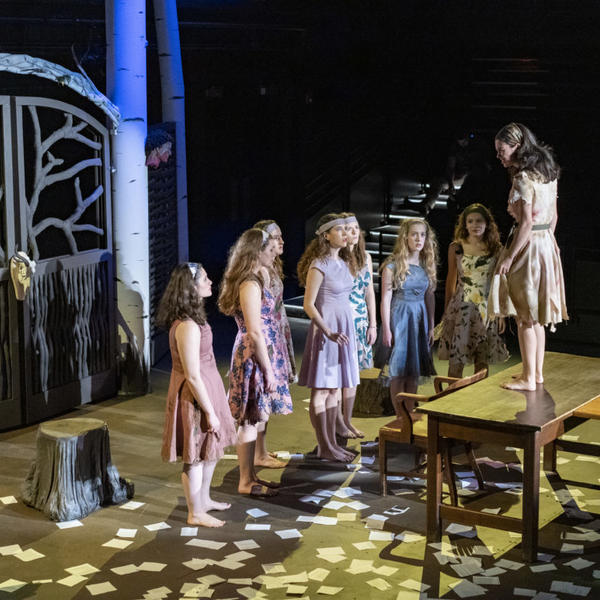When the actors take the stage in “Iphigenia,” the inaugural theater production at the Prior Performing Arts Center, (the performing arts center; the center). the audience can expect an intimate and visceral experience that only the building's Boroughs Theatre can provide, according to Director Edward Isser.
“‘Iphigenia’ was chosen to be the inaugural theater production for the performing arts center because it demonstrates the potential of the facility to be a place for interdisciplinary intersection between scholarship and artistic creativity, theory and praxis, and the ethical and profane. It seems to be the perfect choice,” said Isser, distinguished professor of ethics and society.
Isser worked with Mary Ebbott, professor of classics, to combine two of the surviving plays of Greek playwright Euripides: “Iphigenia at Aulis” and “Iphigenia Among the Taurians.” Although the two have historically not been performed together, Isser and Ebbott, who translated the Greek text for a modern audience, saw an opportunity to show two contrasting times in the main character’s life. Performances will run Nov. 3-6 and 10-13.
In doing so, they have taken a classic story and presented it in a new way, demonstrating the continuing relevance of classical drama to today’s world. Iphigenia, the embodiment of youthful, innocent idealism, is a young girl who sacrifices herself for a hollow and meaningless endeavor, the Trojan War, and then becomes an embittered, murderous avenger who is miraculously redeemed by her love for her brother. Set in the 1960s and 1970s, the production transposes the action to the latter half of the 20th century and explores how the idealism of the young is exploited in pursuit of the cynical ends of their elders.
Doing justice to Euripides’ work required a setting that allowed Isser to play with technology in order to showcase the spectacle of Greek tragedy and Ebbott’s translation of Euripides’ Greek text.
The center's Boroughs Theatre allowed for exploration of a variety of seating configurations to create an intimate environment that creates a more intense and visceral experience for the audience, according to Isser. It also provides a level of technology that allows the director to showcase the dialogue, music and movement.
“We can now dream of something that we previously had not been able to conceive. It’s a transformative space and there are boundless opportunities,” Isser said.
Ebbott, who has studied the works of Euripides and knows his conventions and style, worked scene by scene and line by line with Isser to present the narratives to a modern English-speaking audience.
Dialogue that would be difficult for a modern audience to understand without prior knowledge of the story was removed and other sections were slightly rearranged for clarity, but the ancient story did not change, Ebbott said.
The expectation was to create, through the translated text, an audience experience in 2022 that is imagined to be similar to that experienced by ancient Greeks 2,500 years ago, Ebbott said.
Iphigenia Opens as Inaugural Performance at the Prior Performing Arts Center

The College of the Holy Cross production combines two of Euripides’ ancient plays for a modern audience.


